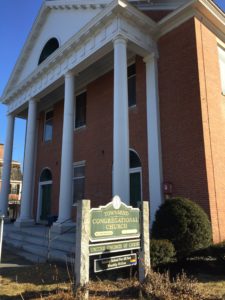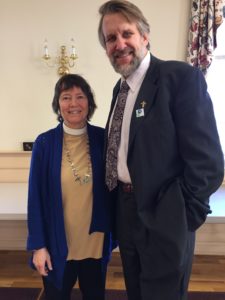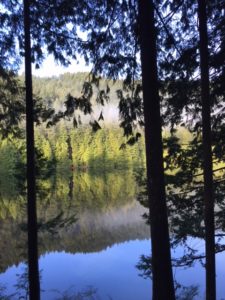Sermon for Evensong Service on the Feast Day of St. Andrew, November 15, 2009.
Delivered by the Rev. Margaret Bullitt-Jonas,
Spiritual transformation
My dear friends at Grace, I bring you greetings from another Grace — Grace Church in Amherst, where I serve as Priest Associate. It is wonderful to be with you on such a festive evening, to hear your choir, and to preach from the pulpit where I last stood in 1996 — when all of us were just a bit younger than we are today. Hanging on the wall of my study at home is a large, framed portrait of this congregation gathered on the lawn beside the church under a bright, blue sky. It is a portrait that makes me happy, and I look back with affection at my years of ministering with you. It is good to see how this parish continues to thrive, and I am grateful to Miriam, your Rector, for inviting me here tonight.
I was thinking about what has changed in our lives since I preached here thirteen years ago. One thing that stands out for me is our increasing awareness of the enormous, even decisive, challenges that confront the whole human enterprise. Today we see much more clearly than we did ten or fifteen years ago that we are facing a convergence of powerful trends — climate change, the rise of the world’s population, species extinction — that influence each other and reinforce each other and together present a grave threat to the future of life as it has evolved since Homo sapiens first emerged in Africa some 200,000 years ago.
Take climate change, for instance. We now know that burning fossil fuels such as coal and gas and oil releases heat-trapping gases into the atmosphere. The amount of carbon dioxide in the atmosphere has reached a level today that hasn’t been seen on earth for at least 800,000 years, and probably much longer. In just the last few years, scientists have determined that the safe upper limit for carbon dioxide in the atmosphere is 350 parts per million. If we want to keep living on a habitable planet, if we want human civilization to keep flourishing as it has for the past 10,000 years, if we want to pass on to our children and our children’s children something like the beautiful, diverse, and lively earth into which you and I were born, then we have to stabilize the global level of carbon dioxide in the atmosphere at no more than 350 parts per million. What is the level now? Almost 390, and climbing.
Already the effects of climate change are visible in far away places like Asia, where the Himalayan glaciers are rapidly melting, and where the many rivers that are fed by those glaciers — providing fresh water to hundreds of millions of people — are now at risk. In far-off Africa, deserts are spreading. In the Pacific Islands, rising seas are flooding the coasts, and one low-lying country, the Maldives, is in line to become the first nation to be destroyed because of climate change. Closer to home, here in New England global warming is already affecting right whales, lobster, and Atlantic cod. Within the century we may lose our maple, birch, and beech trees, along with habitat for our state bird, the black-capped chickadee.
At the same time that climate change is stressing the limits that allow life as we know it to continue, the world population continues to grow. Can you guess how many people have been added to the planet since I was here in 1996? One billion. Today the world’s human population numbers 6.7 billion, and, according to the U.S. Census Bureau, by 2050 it will be more than 9 billion. 1 That makes for a heavy burden on the world’s fresh water supplies and arable land, and on our capacity to grow enough food.
Then factor in another trend, species extinction. A report released earlier this month shows that degraded habitat is threatening a record number of species — 12% of all bird species, 28% of reptiles, 37% of all freshwater fish, and 21% of all mammals — this according to the International Union for the Conservation of Nature, whose so-called Red List of Threatened Species is considered the authority on the status of the world’s creatures. 2
I haven’t even mentioned the other unsettling trends that might spring to mind, from deforestation to ocean overfishing. The point is that in the last decade or so it has become abundantly clear that we are looking at the approaching possibility of what one thinker, Duane Elgin, calls “an unprecedented whole-system crisis.” 3 The ground is shifting under our feet. We sense the approaching end of an old way of being and wonder what new way of being we can create in its place. Modern industrial society, with its sudden expansion of our capacity to extract and consume the planet’s abundance for the sake of short-term profit, is simply not sustainable. For the past 250 or 300 years, human beings have been extracting resources faster than they can be replenished, and dumping waste faster than the Earth can absorb it. Those who are rich live in a luxury once reserved for kings, while the billions who are impoverished struggle for clean water and a mouthful of food. Species are going extinct at a rate unprecedented since the death of the dinosaurs. The global climate with its delicate balance of gases turns out to be more fragile then we ever imagined.
As a result, many of us now walk around with a more or less vivid awareness that a chapter of human history is coming to an end. More and more people around the world are searching for ways to create something new – to bring forth a human presence on this planet that is “environmentally sustainable, spiritually fulfilling, and socially just.” 4 We don’t have much time to accomplish this, so it is a precarious and precious time to be alive and to take part – if we so choose – in this great work of healing.
So I come to the Gospel tonight with a more than casual interest. I come to the Gospel tonight looking for spiritual nourishment in a time of evolutionary crisis. I come to Jesus and the familiar story of our brother Andrew, looking for clues to a path forward. What spiritual leap of consciousness can help us to pull together as a human family? What spiritual wisdom can incite and inspire us to become healers and transformers of the world? What spiritual insights can help us to root ourselves in the divine love that is always with us, even in a time that is so charged with peril?
Tonight I want to give you three words based on our Gospel reading, three words that perhaps can point the way to our spiritual awakening. The first word is Seek. As we heard in the story, Andrew and an unnamed disciple of John the Baptist happen to see Jesus walk by. When they start to follow Jesus, Jesus turns and asks them, “What are you looking for?” John 1:38. In other words, what do you seek? What really motivates you? What do you want most deeply? Jesus asks a version of this question many times. To James and John, the sons of Zebedee, he asks, “What is it that you want me to do for you?” Mark 10:36. To blind Bartimaeus, he asks, “What do you want me to do for you?” Mark 10:51. To Mary, who stands weeping at the tomb, he asks, “Whom are you looking for?” John 20:15. To the crowds, he says, “Ask, and it will be given; search, and you will find; knock, and the door will be opened for you” Matthew 7:7.
Jesus knows that spiritual growth involves a search and a seeking, and he challenges us to keep probing our desires, to clarify them, to carry out what we might call an archaeology of desire. On the surface level, we want all sorts of things, the sorts of things that modern industrial society tells us are important — plenty of money and a heap of possessions, a big house, the latest gadget, cars, boats, fame, power — in short, success in the eyes of the world. But scrambling for goals like these is just what has landed us, and the rest of the planet, in the crisis in which we now find ourselves. So Jesus asks us to dig deeper. What are you looking for — really? It is only when we touch into our deeper desires — perhaps a desire for wholeness or a desire for meaning, a desire for loving interpersonal relationships or for inner peace, that we can begin to sense what is perhaps the deepest longing of all, the desire to draw close to the divine Source of love, the desire for union with God.
“What are you looking for?” is a question that keeps us alert to our deepest intentions, so that moment to moment we can check and see whether or not what we are about to say or do, or what we have just said or done, is in alignment with our deepest desires. For those who hunger for a world in which human beings live at peace with each other, with other creatures, and with their Creator, keeping a focus on what we seek gives us a compass for the journey ahead. If I know what I really seek, then perhaps I can live with a little more restraint — I can commit myself to significantly reducing my carbon footprint; I can turn off extra lights, turn down the heat, and wear a sweater indoors; I can walk more and drive less; I can forego the trip to the mall, share more of what I have with my church and with the poor, and live with greater simplicity, gratefulness, and joy.
If Jesus’ first word to us tonight is Seek, his second is Abide. When the two disciples ask where Jesus is staying, he answers, “Come and see.” And, the story tells us, “They came and saw where he was staying and they remained with him that day” John 1:39. “They remained with him that day.” And we can, too. Day by day we, too, can remain with Jesus; we, too, can abide with him. Like Andrew and the unnamed disciple, we, too, can have intimate, daily contact with our teacher and savior and friend, and let not just our mind but also our character and values, our hopes and dreams — in fact, our whole being — be shaped and changed through daily, personal contact with the one with whom we remain, the one with whom we are abiding and who abides with us.
When we abide with God in Christ, we take time to pray, to sit in silence and listen to the inner voice of love, and we wander outside to gaze in wonder at the living, natural world through which God is always revealing God’s Self to us. Abiding with Jesus means opening oneself to his love, and daring to tell him the truth of our hopes and fears, our needs and wounds. Abiding with Jesus means letting him breathe into us the breath of the Holy Spirit, so that with every breath we take, we breathe in the love of God, and with every breath we release, we release that love more fully into the world around us. Abiding with Jesus means that we die to an ego-centered self, an ego-centered life, and open ourselves to becoming a vehicle of God’s energy and love.
Seek. Abide. Those are two messages I hear, and the third is Reach out.
Andrew is the first person in John’s Gospel to recognize Jesus as the Messiah, the Christ who embodies and conveys the fullness of God’s presence. And he is also the first Christian evangelist. According to the story we just heard, as soon as Andrew recognizes Jesus as the Messiah, he goes out to find his brother Simon Peter and brings him to Jesus.
Now I know that some of us cringe at the thought of (quote/unquote) “bringing someone to Jesus.” To my ears, anyway, it can sound so narrow and self-righteous, so pompous and smug, so — well — evangelical, in the very worst sense. But it is worth noticing that the Gospel story does seem to imply a three-part movement of spiritual transformation that goes something like this: seek out what matters most to you and let your life be guided by that deep purpose and intention; abide today and every day in a loving relationship with God in Christ, letting it form and transform you; and then — reach out. Let the love that you have known spill out into the world around you. Let the joy and freedom and intimacy that you have known in Christ pour out to every person you meet.
The world around us is in so much pain. There is so much loneliness around us — so much anxiety and fear. Can we find ways to connect, to heal, to serve? Can we find ways to express and share and embody in very tangible ways the love that we have known in Christ? I suppose that this is one test of the spiritual journey — whether or not we are actively looking for ways to be healers and transformers of the outside world. Bearing witness to Christ can take many forms, but given the crisis in which we now find ourselves, from climate change and population growth to species extinction, finding some way to serve God in the larger world has never been more urgently needed.
After this service is over, I am heading straight to the Boston Common, where several hundred young people, in partnership with the Massachusetts Council of Churches, are gathering for a climate rally to urge our Governor and legislature to commit the Commonwealth to using 100% clean electricity within ten years and to doing our part to bring the level of atmospheric carbon dioxide back down to 350 parts per million. I find the group’s motto quite catchy: “Nothing less than 100%. Nothing more than 350.” I will be one of the speakers at the rally, and even though I don’t plan to mention the name of Jesus, I do see this work as being part of my call to evangelism, part of my call to invite and encourage people to find a more socially just, environmentally sustainable, and spiritually satisfying way to live on the Earth. I would be happy to give any of you who want to join me a ride into town. But above all I want to support you in finding your own way to reach out, your own way to serve. I don’t know anyone who is a happier than the person who has sought and found a way to serve.
Seek. Abide. Reach out. I give thanks to Jesus for his encounter with our brother Andrew, and for showing us a path to spiritual enlightenment and social transformation just when we need it most.
_________________________________________________________________________________________
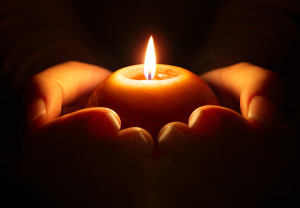
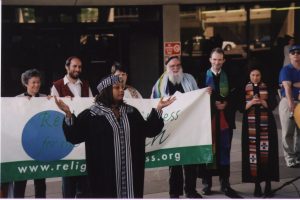
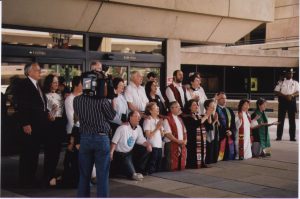
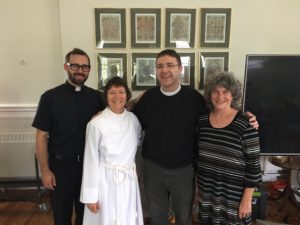
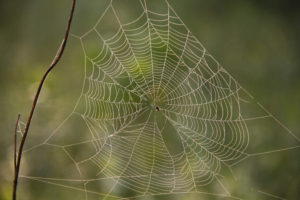
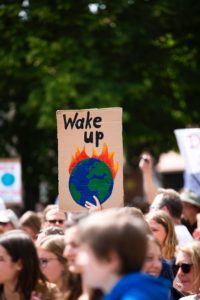
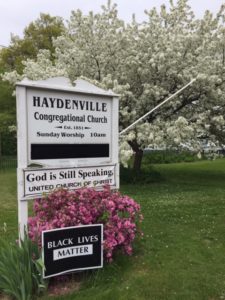 These are urgent and tender words, the words of someone facing death and eager to convey what really matters. “Little children, love one another.” I’m told that in John the Evangelist’s old age, that was the basic message he brought to one community of faith after another: “Little children, love one another.” After spending time with Jesus, and after years of meditating on Jesus’ life and teaching, on Jesus’ crucifixion and resurrection, the aging evangelist could find no more direct route into the heart of the Gospel than simply to say, “Little children, love one another.”
This brings to mind a poem by Michael Leunig:1
There are only two feelings. Love and fear.
There are only two languages. Love and fear.
There are only two activities. Love and fear.
There are only two motives, two procedures,
two frameworks, two results.
Love and fear.
Love and fear.
As followers of Jesus, we may be called to love, but I don’t for a moment believe that we’re not also well acquainted with fear. I remember my childhood fears, such as my fear of the monsters lurking under the bed, and how important it was not to let even one toe stick out beyond the edge of the mattress. I remember my fear that when my parents went out at night, they might not come back. I remember my fear of the swarm of bees that nested near the front door; my fear, during piano recitals, that I might forget which note came next; my fear that I might be chosen last for the softball team, or, what’s worse, that the ball might actually come hurtling in my direction and – dreadful thought – all my team-mates would count on me to catch it.
The fears of a child gradually morph into the fears of an adult, and even though we grownups may go to a great deal of trouble not to appear anxious or afraid, most us face some kind of fear every day. Fears come in all shapes and sizes. What are you afraid of? Chances are excellent that several of us fear the same thing. And we know what that’s like: how, when frightened, we hold our breath, our bellies clench and our hearts race.
There’s a lot of fear going around these days, and we have reason to worry. In addition to our personal fears, we feel a collective shudder about the state of the world, from the assault on women’s reproductive rights to the harsh treatment of immigrants. For me, it’s the ecological crisis that wakes me up at night, for scientists are reporting with increasing concern that the web of life is unraveling before our eyes and that human civilization is at risk of collapse. Just think of it: the number of animals around the world has plummeted by over half in less than 50 years, mostly by the development of great swaths of land and the destruction of habitat.
These are urgent and tender words, the words of someone facing death and eager to convey what really matters. “Little children, love one another.” I’m told that in John the Evangelist’s old age, that was the basic message he brought to one community of faith after another: “Little children, love one another.” After spending time with Jesus, and after years of meditating on Jesus’ life and teaching, on Jesus’ crucifixion and resurrection, the aging evangelist could find no more direct route into the heart of the Gospel than simply to say, “Little children, love one another.”
This brings to mind a poem by Michael Leunig:1
There are only two feelings. Love and fear.
There are only two languages. Love and fear.
There are only two activities. Love and fear.
There are only two motives, two procedures,
two frameworks, two results.
Love and fear.
Love and fear.
As followers of Jesus, we may be called to love, but I don’t for a moment believe that we’re not also well acquainted with fear. I remember my childhood fears, such as my fear of the monsters lurking under the bed, and how important it was not to let even one toe stick out beyond the edge of the mattress. I remember my fear that when my parents went out at night, they might not come back. I remember my fear of the swarm of bees that nested near the front door; my fear, during piano recitals, that I might forget which note came next; my fear that I might be chosen last for the softball team, or, what’s worse, that the ball might actually come hurtling in my direction and – dreadful thought – all my team-mates would count on me to catch it.
The fears of a child gradually morph into the fears of an adult, and even though we grownups may go to a great deal of trouble not to appear anxious or afraid, most us face some kind of fear every day. Fears come in all shapes and sizes. What are you afraid of? Chances are excellent that several of us fear the same thing. And we know what that’s like: how, when frightened, we hold our breath, our bellies clench and our hearts race.
There’s a lot of fear going around these days, and we have reason to worry. In addition to our personal fears, we feel a collective shudder about the state of the world, from the assault on women’s reproductive rights to the harsh treatment of immigrants. For me, it’s the ecological crisis that wakes me up at night, for scientists are reporting with increasing concern that the web of life is unraveling before our eyes and that human civilization is at risk of collapse. Just think of it: the number of animals around the world has plummeted by over half in less than 50 years, mostly by the development of great swaths of land and the destruction of habitat. 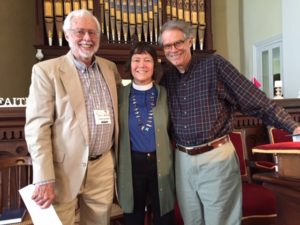
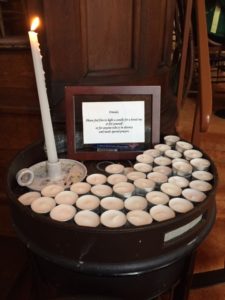 I will end with a story about love and fear.4 Back in 2001 I screwed up my courage and decided to carry out my first act of civil disobedience. That’s how I met your former pastor, Andrea Ayvazian: in Washington, DC, where she was helping to organize a new interfaith group, Religious Witness for the Earth, that was planning to protest President Bush’s intention to drill for more oil in the Arctic.
Here’s what happened: On the first day we learned about oil drilling and the Arctic, about climate change and fossil fuels. On the second we lobbied our members of Congress and studied the disciplines of non-violent civil disobedience. On the third, about a hundred of us marched down Independence Avenue in religious vestments, carrying banners and singing. When we reached the Department of Energy, an enormous stone structure surrounded by police, we held a brief worship service. So far, everything was legal. Then came the part that wasn’t. I’ll read from an essay I wrote about what that was like.
The worship service was coming to an end. We sang “Amazing Grace,” and then the twenty-two of us who had decided to risk arrest joined hands and walked slowly to the doors of the Department of Energy.
I felt us cross an invisible boundary. With the others, I stepped over a threshold I could not see. I walked out of my ordinary life.
I am neither a law-breaker nor a thrill-seeker. More often than not, I follow the rules – even enforce them. I fasten my seat belt, don’t cheat on taxes, write thank you notes, and stand up when the band plays our national anthem. But here I was, intentionally and publicly breaking the law. As if some inner revolution had quietly taken place, the old “me” was no longer in charge. Whatever security I’d felt in operating within the rules was gone. That’s partly why I felt so frightened as I left the safety of the circle and moved toward the door: I hardly recognized myself. I hardly knew who I was.
§§
We stand or kneel in prayer, our backs to the building.
The pavement under my knees is hard. At home, I often sit on a meditation cushion to pray. Today there is no cushion, just the weight of my body against stone. I lift up my hands. I’m dressed for Holy Communion. I might as well hold out my arms as I do at Communion.
Instead of pews filled with parishioners, I see ranks of police and a cluster of supporters. I am afraid. I’ve never been arrested before. Years ago, as a VISTA volunteer in Mayor Rizzo’s Philadelphia I heard countless stories of police brutality. It’s not that I really expect the same thing to happen to me – the punch in the gut, the assault behind closed doors. Still, my body tenses as I place myself against the cops, the Feds, the law.
I close my eyes. One by one we pray aloud, words thrown into space, words hurled against stone.
Is this whole thing ridiculous? I briefly open my eyes and notice a well-dressed man watching us. He strokes his tie, leans over and says something to a fellow nearby. The two of them chuckle. I have no idea what they’re talking about but I wonder if they think we look absurd. I suppose we do. Here we are with our jerry-rigged signs, our predictably earnest songs and prayers of protest, a foolhardy band straight out of the ‘60’s.
Defensively, I imagine confronting that mocking man with the arsenal of our credentials. “We’re no rag-tag bunch,” I want to tell him. “We’re people with doctorates and master’s degrees – nurses and ministers, writers and accountants. Thoughtful people, educated people, professionals.”
I am distracted from prayer by this indignant outburst. “Let it go,” wisdom tells me. “None of that matters — your degrees, your skills, your status in the world. The privileges of race and class mean nothing now. You’re a woman on your knees, that’s who you are — one human being pleading with God.”
I turn my attention back to prayer and continue to stretch out my arms. Suddenly I realize that behind the tension, behind the fear and self-consciousness, something else is welling up. I am jubilant.
“Lift up your hearts,” I might as well be saying to the people before me, beaming as broadly as I do at Communion.
“We lift them to the Lord,” would come the response.
How did I miss it? After years of going to church, after years of celebrating Communion, only now, as I kneel on pavement and face a phalanx of cops, do I understand so clearly that praising God can be an act of political resistance. That worship is an act of human liberation. The twenty-two of us come from different faith traditions, but each of us is rooted in a reality that transcends the rules and structures of this world. Tap into that transcendent truth, let the divine longing for a community of justice and mercy become your own deepest longing, and who knows what energy for life will be released?
I feel as defiant as a maple seedling that pushes up through asphalt. It is God I love, and God’s green earth. I want to bear witness to that love even in the face of hatred or indifference, even if the cost is great.
So what if our numbers are small? So what if, in the eyes of the police, in the eyes of the world, we have no power? I’m beginning to sense the power that is ours to wield, the power of self-offering. We may have nothing else, but we do have this, the power to say, “This is where I stand. This is what I love. Here is something for which I’m willing to put my body on the line.”
I never knew that stepping beyond the borders of what I find comfortable could make me so happy. That shifting from self-preservation to self-offering could awaken so much joy.
Love and fear. Love and fear. I invite you to take a moment to remember a time when you took a brave step toward fullness of life, a time when you made a decision to do the right thing, even though you knew it would be difficult or costly. Who inspired you to be bolder than you thought? With whom do you hold hands, literally or figuratively, when you step out to make a difference in the world? And if you knew you could not fail – if you were set free from fear – what would you do for the healing of our world?
Let’s take a moment in silence, and then I invite your response.
1. Michael Leunig, A Common Prayer (NY: HarperCollins, 1991).
2. David Wallace-Wells, The Uninhabitable Earth (New York: Tim Duggan Books, Penguin Random House, 2019).
3. Hafiz, quoted by Jack Kornfield, The Art of Forgiveness, Lovingkindness, and Peace (New York: Bantam Books, 2002), 83.
4. This story is adapted from part of my chapter, “When Heaven Happens,” in the anthology Heaven, ed. Roger Ferlo (New York: Seabury Books, 2007), 78-81.
I will end with a story about love and fear.4 Back in 2001 I screwed up my courage and decided to carry out my first act of civil disobedience. That’s how I met your former pastor, Andrea Ayvazian: in Washington, DC, where she was helping to organize a new interfaith group, Religious Witness for the Earth, that was planning to protest President Bush’s intention to drill for more oil in the Arctic.
Here’s what happened: On the first day we learned about oil drilling and the Arctic, about climate change and fossil fuels. On the second we lobbied our members of Congress and studied the disciplines of non-violent civil disobedience. On the third, about a hundred of us marched down Independence Avenue in religious vestments, carrying banners and singing. When we reached the Department of Energy, an enormous stone structure surrounded by police, we held a brief worship service. So far, everything was legal. Then came the part that wasn’t. I’ll read from an essay I wrote about what that was like.
The worship service was coming to an end. We sang “Amazing Grace,” and then the twenty-two of us who had decided to risk arrest joined hands and walked slowly to the doors of the Department of Energy.
I felt us cross an invisible boundary. With the others, I stepped over a threshold I could not see. I walked out of my ordinary life.
I am neither a law-breaker nor a thrill-seeker. More often than not, I follow the rules – even enforce them. I fasten my seat belt, don’t cheat on taxes, write thank you notes, and stand up when the band plays our national anthem. But here I was, intentionally and publicly breaking the law. As if some inner revolution had quietly taken place, the old “me” was no longer in charge. Whatever security I’d felt in operating within the rules was gone. That’s partly why I felt so frightened as I left the safety of the circle and moved toward the door: I hardly recognized myself. I hardly knew who I was.
§§
We stand or kneel in prayer, our backs to the building.
The pavement under my knees is hard. At home, I often sit on a meditation cushion to pray. Today there is no cushion, just the weight of my body against stone. I lift up my hands. I’m dressed for Holy Communion. I might as well hold out my arms as I do at Communion.
Instead of pews filled with parishioners, I see ranks of police and a cluster of supporters. I am afraid. I’ve never been arrested before. Years ago, as a VISTA volunteer in Mayor Rizzo’s Philadelphia I heard countless stories of police brutality. It’s not that I really expect the same thing to happen to me – the punch in the gut, the assault behind closed doors. Still, my body tenses as I place myself against the cops, the Feds, the law.
I close my eyes. One by one we pray aloud, words thrown into space, words hurled against stone.
Is this whole thing ridiculous? I briefly open my eyes and notice a well-dressed man watching us. He strokes his tie, leans over and says something to a fellow nearby. The two of them chuckle. I have no idea what they’re talking about but I wonder if they think we look absurd. I suppose we do. Here we are with our jerry-rigged signs, our predictably earnest songs and prayers of protest, a foolhardy band straight out of the ‘60’s.
Defensively, I imagine confronting that mocking man with the arsenal of our credentials. “We’re no rag-tag bunch,” I want to tell him. “We’re people with doctorates and master’s degrees – nurses and ministers, writers and accountants. Thoughtful people, educated people, professionals.”
I am distracted from prayer by this indignant outburst. “Let it go,” wisdom tells me. “None of that matters — your degrees, your skills, your status in the world. The privileges of race and class mean nothing now. You’re a woman on your knees, that’s who you are — one human being pleading with God.”
I turn my attention back to prayer and continue to stretch out my arms. Suddenly I realize that behind the tension, behind the fear and self-consciousness, something else is welling up. I am jubilant.
“Lift up your hearts,” I might as well be saying to the people before me, beaming as broadly as I do at Communion.
“We lift them to the Lord,” would come the response.
How did I miss it? After years of going to church, after years of celebrating Communion, only now, as I kneel on pavement and face a phalanx of cops, do I understand so clearly that praising God can be an act of political resistance. That worship is an act of human liberation. The twenty-two of us come from different faith traditions, but each of us is rooted in a reality that transcends the rules and structures of this world. Tap into that transcendent truth, let the divine longing for a community of justice and mercy become your own deepest longing, and who knows what energy for life will be released?
I feel as defiant as a maple seedling that pushes up through asphalt. It is God I love, and God’s green earth. I want to bear witness to that love even in the face of hatred or indifference, even if the cost is great.
So what if our numbers are small? So what if, in the eyes of the police, in the eyes of the world, we have no power? I’m beginning to sense the power that is ours to wield, the power of self-offering. We may have nothing else, but we do have this, the power to say, “This is where I stand. This is what I love. Here is something for which I’m willing to put my body on the line.”
I never knew that stepping beyond the borders of what I find comfortable could make me so happy. That shifting from self-preservation to self-offering could awaken so much joy.
Love and fear. Love and fear. I invite you to take a moment to remember a time when you took a brave step toward fullness of life, a time when you made a decision to do the right thing, even though you knew it would be difficult or costly. Who inspired you to be bolder than you thought? With whom do you hold hands, literally or figuratively, when you step out to make a difference in the world? And if you knew you could not fail – if you were set free from fear – what would you do for the healing of our world?
Let’s take a moment in silence, and then I invite your response.
1. Michael Leunig, A Common Prayer (NY: HarperCollins, 1991).
2. David Wallace-Wells, The Uninhabitable Earth (New York: Tim Duggan Books, Penguin Random House, 2019).
3. Hafiz, quoted by Jack Kornfield, The Art of Forgiveness, Lovingkindness, and Peace (New York: Bantam Books, 2002), 83.
4. This story is adapted from part of my chapter, “When Heaven Happens,” in the anthology Heaven, ed. Roger Ferlo (New York: Seabury Books, 2007), 78-81. 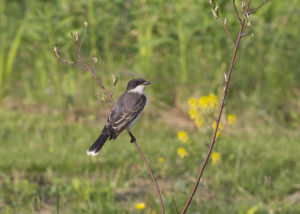
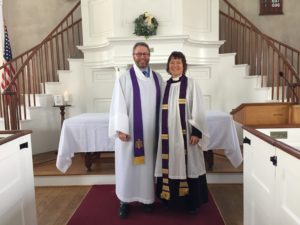
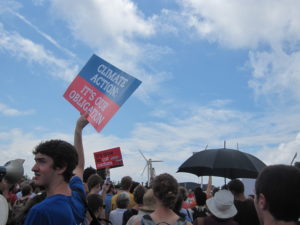
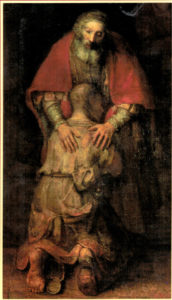
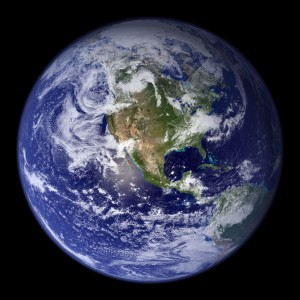 What would it look like if humanity “came to ourselves”? Maybe it would look something like this: one individual after another saying, “Hey, wait a second. We don’t have to live like this. We don’t have to settle for a death-dealing, materialistic society that willy-nilly gobbles up all the land and trees and creatures of this world, extracts and burns dirty fossil fuels, pours toxic pollutants into the water and air, and stuffs the landfill with plastics and waste. We don’t have to settle for a suicidal course that steals a habitable world from our children. Through the grace of God we can make changes in our own lives, so that we live more gently and lovingly on the Earth, and we can resist and protest the powers-that-be that are determined to make huge profits by treating people and planet alike as completely disposable, extracting every last drop of oil and gas and every last ounce of coal, and cutting down every last tree.” We can say to ourselves, “I’m going to turn my own life around and make the changes I can make, and I’m also going to stand with all the people of the world who want what I want – a society marked by generosity, not greed; by justice, not prejudice and inequity; by love, and not indifference and hate.” Like the prodigal son, we can say to ourselves “I will get up and go to my father” (
What would it look like if humanity “came to ourselves”? Maybe it would look something like this: one individual after another saying, “Hey, wait a second. We don’t have to live like this. We don’t have to settle for a death-dealing, materialistic society that willy-nilly gobbles up all the land and trees and creatures of this world, extracts and burns dirty fossil fuels, pours toxic pollutants into the water and air, and stuffs the landfill with plastics and waste. We don’t have to settle for a suicidal course that steals a habitable world from our children. Through the grace of God we can make changes in our own lives, so that we live more gently and lovingly on the Earth, and we can resist and protest the powers-that-be that are determined to make huge profits by treating people and planet alike as completely disposable, extracting every last drop of oil and gas and every last ounce of coal, and cutting down every last tree.” We can say to ourselves, “I’m going to turn my own life around and make the changes I can make, and I’m also going to stand with all the people of the world who want what I want – a society marked by generosity, not greed; by justice, not prejudice and inequity; by love, and not indifference and hate.” Like the prodigal son, we can say to ourselves “I will get up and go to my father” (
